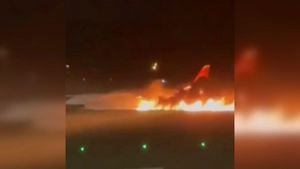On the evening of November 18, 2024, the city of Sumy, located in northeastern Ukraine, faced yet another tragic episode as Russian missiles struck residential buildings, resulting in widespread devastation and loss of life. Reports indicate at least 11 fatalities, including two children, and around 89 individuals were injured, marking this as one of the deadliest attacks on the region since the inception of the war. Eyewitnesses described scenes of chaos and despair as rescuers worked tirelessly to search for survivors among the rubble.
The missile strike came amid heightened tensions and escalated airstrikes, with authorities confirming the hit on multiple residential buildings, leaving many residents without electricity and access to basic utilities. The Sumy city council detailed the extent of the damages, stating, "We are still assessing the full impact. The community is heartbroken as we mourn the loss of innocent lives." The latest strikes followed Russia's largest aerial assault on Ukraine seen in months, where approximately 120 missiles and 90 drones targeted various regions, including notable strikes on energy infrastructure.
After surviving attacks, Sumy residents expressed their feelings of vulnerability and fear. An eyewitness recounted, "We heard the alarm, but we had no time to take cover. It was like the ground shook beneath us, and then everything went dark." The chaos overwhelmed the local emergency services, as first responders battled the flames and searched through debris for those possibly trapped inside.
This turbulence continues as Ukraine has seen repeated strikes disrupting military and civilian infrastructure. Amid this turmoil, Ukrainian officials have reiterated their calls for continued global assistance to bolster air defense systems, emphasizing the urgent need for advanced technology to counter these relentless missile threats.
On the diplomatic front, the international community has openly condemned these attacks, with many countries expressing solidarity with Ukraine. UN Secretary-General Antonio Guterres condemned the assault as "unacceptable" and highlighted the targeting of civilian infrastructure as harmful to peace efforts. Guterres called for immediate actions to hold those responsible accountable, insisting on the protection of civilians amid warfare.
Recent developments escalate the stakes even higher; the United States has reportedly authorized Ukraine to use U.S.-made weaponry for operations targeting deep within Russian territories, signaling a significant shift in military engagement. This authorization reflects Washington's commitment to supporting Ukraine's defense efforts, though it raises concerns among officials about potentially provoking severe retaliatory actions from Russia.
Poland, a NATO member sharing borders with Ukraine and Russia, took precautionary measures by scrambling its air force following the missile barrage, showcasing the broader regional anxieties surrounding the conflict. France has similarly indicated openness to allowing Ukraine to strike Russian military targets, cementing the growing military collaboration among Western nations backing Kyiv.
This latest wave of attacks feeds the relentless dread pervading Ukrainian communities, as citizens grapple with the immediate challenges of surviving modern warfare. Many are calling for comprehensive strategies aimed at ensuring safety and stability as the fighting drags on. Living through this war has become part of their daily lives, yet each new assault deepens their trauma.
Evidence of the psychological toll on residents is becoming increasingly apparent. Local psychologists report rising instances of PTSD and anxiety among survivors who live with the constant threat of bombs. Efforts are underway to provide psychosocial support aimed at helping individuals navigate their everyday fears.
The situation remains fluid and precarious. Authorities warn residents to maintain high alert for potential future assaults, reinforcing the reality of life under siege. Community organizations and government agencies are mobilizing resources to support recovery efforts, including temporary housing, counseling services, and medical care for the injured.
The missile strikes demonstrate the war’s grim reality, demonstrating how conflict intertwines with the very fabric of daily life, altering relationships, routines, and futures. For the people of Sumy, this attack was not just another incident; it represented real people, neighbors, families lost to the cruelties of war, pushing the need for peace and resolutions to the forefront of urgent global concern.
Moving forward, the calls for accountability and peace grow louder within the international community, highlighting the delicate balance of power and the necessity for diplomatic engagement. For now, as Sumy mourns, the world watches closely, holding its breath for moments of reprieve from this protracted conflict.



